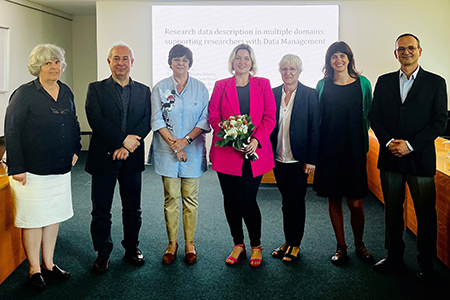Candidate:
Yulia Karimova
Date, time and place
June 2, 14:00, Sala de Atos FEUP
President of the Jury
António Fernando Vasconcelos Cunha Castro Coelho, PhD, Associate Professor with habilitation, Faculdade de Engenharia da Universidade do Porto.
Members
Maria Manuel Lopes de Figueiredo Costa Marques Borges, PhD, Associate Professor, Departamento Filosofia, Comunicação e Informação, Faculdade de Letras da Universidade de Coimbra;
José Luis Brinquete Borbinha, PhD, Full Professor, Instituto Superior Técnico da Universidade de Lisboa;
Irene Pimenta Rodrigues, PhD, Associate Professor, Departamento de Informática, Escola de Ciências e Tecnologia da Universidade de Évora;
Maria Cristina de Carvalho Alves Ribeiro, PhD, Associate Professor, Departamento de Engenharia Informática, Faculdade de Engenharia da Universidade do Porto (Supervisor);
Carla Alexandra Teixeira Lopes, PhD, Assistant Professor, Departamento de Engenharia Informática, Faculdade de Engenharia da Universidade do Porto.
Abstract
The growing amount of research data and the recognition of their value in the scientific community has led to the development of policies, infrastructures, tools and services. Researchers are encouraged to open their data and make them FAIR (Findable, Accessible, Interoperable and Reusable) to ensure the verifiability of results and transparency of research, while increasing their value. In this context, Research Data Management (RDM) becomes a vital component of high-quality research and a regular activity for researchers. The Data Management Plan (DMP), provision of quality metadata, repository selection, and data publication are some of the activities that researchers need to undertake when following the Open Science policies. However, these activities are time-consuming and not obvious to researchers, requiring specific knowledge, effort and experience. To support researchers, institutions are looking for solutions and developing workflows, tools, systems and services that aim to meet RDM requirements of both researchers and funding agencies. Implementing any information system, tool or service at a research institution requires their development, testing and evaluation, as well as adaptation to existing regulations. In this work, we present the development of a DMP support system that meets RDM requirements and researcher needs. We also propose its implementation in the institutional infrastructure and workflow. We explore various aspects related to the DMP support system development, namely RDM and DMP requirements and legislation at the international and national levels, institutional project management and RDM workflows, existing initiatives, recommendations and tools. We introduce a collaborative DMP-building method based on collaboration between researchers and a data steward. We describe its application to case studies from different scientific domains, analyze the results and propose its systematic evaluation. We also propose a path that simplifies the DMP creation process, to make plans more standard, high-quality, and detailed, by implementing controlled vocabularies in the DMP support system. To this end, we apply the collaborative method on projects from the same scientific domain, identifying specific aspects for this domain and proposing terms that can be used with controlled vocabularies and possibly contributing to the design of Domain Data Protocols. The proposed DMP support system also considers the existing mechanisms of automation and interoperability, namely the machine-actionable DMP (maDMP) standard. We analyze the maDMP standard and existing tools created according to this standard and propose a DMP structure and a DMP workflow that can help to make the DMP machine-actionable. Finally, we suggest the implementation of the DMP support system in the institutional RDM workflow, and the interface to support researchers in DMP creation and RDM activities in general. Moreover, this work concludes that the DMP support system can be implemented in any institution, and used for projects in different scientific domains. The results constitute a guide for institutions that are still at the beginning of the development of the RDM infrastructure. The feedback from researchers shows that they need support in DMP creation and monitoring, not only at the planning stage of the project but also during its course and sometimes even after. They are very positive about the implementation of the proposed system, highlighting its importance and necessity. Along with researchers, institutions also benefit from the implementation of such a system by providing support to researchers in RDM issues, reducing the time to create plans, improving the quality of DMPs and making projects comply with the RDM and funders’ requirements, thereby contributing to the prestige of the institution.
